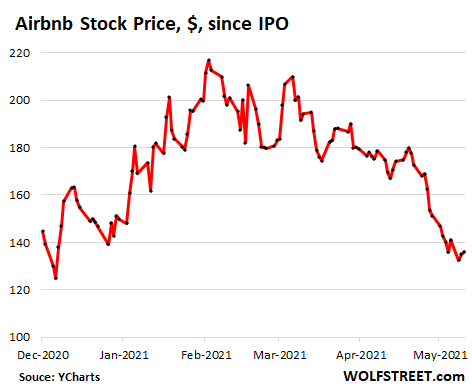Airbnb Shows How San Francisco’s Office Shortage Is Suddenly a Historic Glut: Hogging Vacant Space for a Future that Never Came
by Wolf Richter, Wolf Street:
 They all did it, from Salesforce, Uber, and Twitter on down. It was pure magic, a show produced with enormous hype. Now they’re all trying to get out at the same time.
They all did it, from Salesforce, Uber, and Twitter on down. It was pure magic, a show produced with enormous hype. Now they’re all trying to get out at the same time.
When Airbnb reported a net loss of $1.17 billion for Q1 last week, it also disclosed in its shareholder letter that this loss included a $113 million expense that it expects as it is trying to “exit” an office lease in San Francisco “that we deemed no longer necessary given our restructuring and cost cutting efforts.”
TRUTH LIVES on at https://sgtreport.tv/
The $113 million expense represents its estimate of the difference between what it would get by subleasing the space to new tenants and what it will have to pay the landlord and related expenses over the remaining term of the lease. But that’s a cheaper way out than letting it sit vacant and paying the landlord until the lease terminates.
What’s fascinating about this is just how much office space Airbnb had secured with long-term office leases during the years of the so-called office shortage that it never even occupied, and that by leasing office space that it didn’t need, it had further increased the office shortage at the time.
Airbnb’s disclosure relates to its 287,000 square feet (sf) at 650 Townsend St. in the South of Market area. According to the San Francisco Business Times, Airbnb had leased the space in 2017 for a term of nine years. But it only ever occupied 170,000 sf of it. The rest had remained vacant for all these years.
This brings the total amount of office space in San Francisco that Airbnb is now trying to sublease to 427,000 sf, spread over three buildings. The represents about half of Airbnb’s total office space in San Francisco.
They all did it, from Salesforce, Uber, and Twitter on down, chasing after office space they imagined they might need in the future, assuming endless rapid growth of everything. And by leasing office space they didn’t need and often didn’t occupy, they also aggravated the office shortage, all along driving up office rents into the ludicrous realm.
It was pure magic, a show produced with enormous hype. And now they’re all trying to shed this vacant office space – from Salesforce, Uber, and Twitter on down – by putting it on the sublease market all at the same time, thereby unwinding those office dreams, and thereby creating San Francisco’s worst-ever historic office glut.
In San Francisco, sublease inventory exploded to a new historic high of 8.9 million square feet in Q1, according to real estate services provider Savills. The total availability rate (sublease and direct lease from landlords) rose to 23.6% of total office space. And Class A asking rents fell by 15% year-over-year.
But the drop in asking rents is not an adequate measure in this environment because actual leases are being signed at 10% to 15% below asking rents, and because huge incentives are being negotiated on top of it, such as improvement allowances up to $80 per sf more than in pre-Covid deals and an extra three months of free rent, according to John McNellis of McNellis Partners.
Leasing activity in Q1 collapsed by 85% from Q1 2019. Of those few leases that were signed, over half were lease renewals. This is the environment Airbnb is facing in trying to sublease its unneeded office space.
Airbnb’s stock [ABNB] has been having a hard time in recent weeks, and given the $1.17 billion loss in Q1, it makes sense for the company to try to cut costs. Since the closing high on February 11, the share price has dropped 38% to $136 at the moment (data via YCharts):

In terms of bringing employees in San Francisco back to the office versus working from anywhere, Airbnb is going to create a hybrid model.
“We want to model the live-anywhere lifestyle. So by modeling the live-anywhere lifestyle, we’re going to allow more flexibility for our employees,” said CEO Brian Chesky during the earnings call (transcript via Seeking Alpha).
“I told our employees, they don’t have to come back to the office until next September. And even when we do ask people to come back, they’re going to have a lot more flexibility than before,” he said.
“People aren’t going to be expected to come back to the office five days, week every week. We think that is really not how most workplaces in the 21st century are going to operate,” he said.



